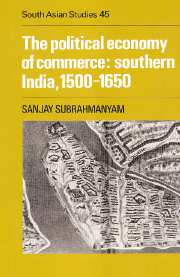Book contents
- Frontmatter
- Contents
- List of illustrations
- List of tables
- Preface
- Abbreviations used
- Introduction
- 1 The political economy of southern India, 1500–1650: preliminary remarks
- 2 Coastal trade and overland trade: complementarities and contradictions
- 3 Overseas trade, 1500–1570: traders, ports and networks
- 4 Overseas trade, 1570–1650: expansion and realignment
- 5 Europeans and Asians in an age of contained conflict
- 6 External commerce and political participation
- 7 Situating trade: models and methodological strategies
- Conclusion
- A note on currency and weights
- Glossary
- Note on sources
- Bibliography
- Index
- CAMBRIDGE SOUTH ASIAN STUDIES
- Frontmatter
- Contents
- List of illustrations
- List of tables
- Preface
- Abbreviations used
- Introduction
- 1 The political economy of southern India, 1500–1650: preliminary remarks
- 2 Coastal trade and overland trade: complementarities and contradictions
- 3 Overseas trade, 1500–1570: traders, ports and networks
- 4 Overseas trade, 1570–1650: expansion and realignment
- 5 Europeans and Asians in an age of contained conflict
- 6 External commerce and political participation
- 7 Situating trade: models and methodological strategies
- Conclusion
- A note on currency and weights
- Glossary
- Note on sources
- Bibliography
- Index
- CAMBRIDGE SOUTH ASIAN STUDIES
Summary
There are many today who would doubt whether the year 1498 marks the beginning of a wholly new epoch in the history of Asia, what the late K.M. Panikkar liked to term the ‘Vasco da Gama epoch’. As a general proposition, it would be far more acceptable to state that 1500 marks a sharp break in historiography, and that this is in large measure on account of the new sources for the writing of Asian history that make themselves available from the early sixteenth century on. The impact of these sources is particularly marked on that part of economic history which deals with the exchange economy, which is to say the study of trade. From the period of Afonso de Albuquerque, the historian has available to him an unusually rich collection of documents generated by the Portuguese presence in Asia. These tend to peter out somewhat in the third quarter of the sixteenth century, only to revive in the last twenty years of the century.
The arrival of the northwest Europeans in Asia at the turn of the seventeenth century adds still further to this corpus of documentation. The archives of the trading Companies, in particular the Dutch and the English, when taken together with the scattered Portuguese documentation, represent a formidable body of data on trade and related questions. Further, in contrast to the evidence from the sixteenth century, which is sporadic and somewhat unevenly distributed over time, the Company documentation of the seventeenth century is a far more orderly set, and is particularly valuable because of the consistent and routine manner in which it is generated, and also because a relatively large proportion has survived.
- Type
- Chapter
- Information
- Publisher: Cambridge University PressPrint publication year: 1990

